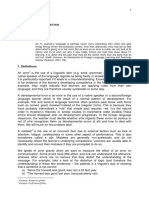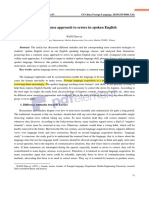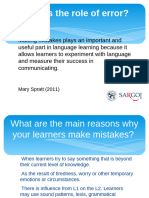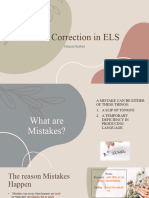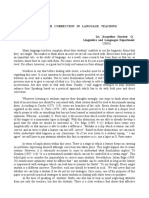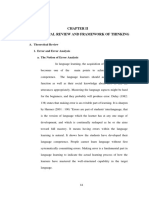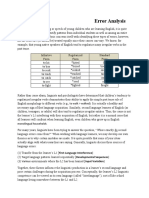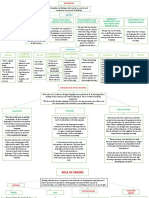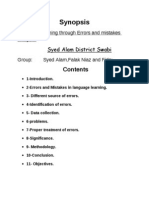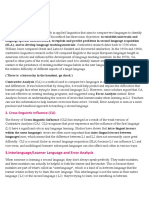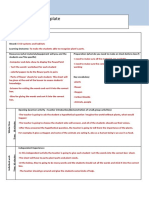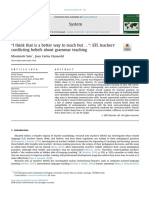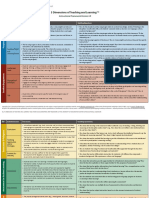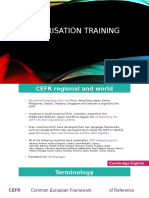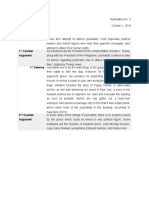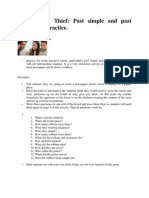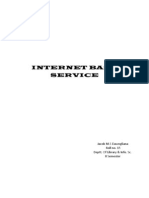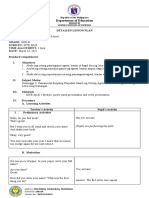Unit 11 The role of error
• What is the role of error?
Making mistakes plays an important and useful part in language learning because
it allows learners to experiment with language and measure their success in
communicating. This unit focuses on the kinds of mistakes learners make when they
speak or write a foreign language, why they make these mistakes and the part that
mistakes play in language learning .
• Key concepts
What are the main reasons why your learners make mistakes?
Mistakes are often categorised into errors and slips. Errors occur when learners
try to say something that is beyond their current level of knowledge or language
processing (working on the language unconsciously to try to understand and learn
it). Usually, because they are still processing or don't know this part of the language,
learners cannot correct errors themselves because they don't understand what is
wrong.
SUps are the result of tiredness, worry or other temporary emotions or
circumstances. We make them because we are not concentrating on what we are
saying or writing. They are not a result of incomplete language processing or a lack
of knowledge. They happen simply because our attention is somewhere else at that
moment. These kinds of mistakes can be corrected by learners themselves, once they
realise they have made them.
There are two main reasons why second language learners make errors. The first
reason is influence from the learner's first language (mother tongue/LI) on the
second language (L2). This is called interference or transfer. Learners may use sound
patterns, lexis or grammatical structures from their own language in English.
The second reason why learners make errors is because they are unconsciously
(without knowing or being aware) working out, organising and experimenting with
language they have learnt, but this process is not yet complete. This kind of error is
called a developmental error. These errors are common to all learners, whatever
their Ll, and are often similar to those made by a young first language speaker as part
of their normal language development. Common developmental errors in English are
using the past tense for the present perfect tense, or making mistakes with past verb
forms. For example, very young first language speakers of English as well as English
language learners often say things like '1 goed' instead of '1 went'. Errors such as this
one, in which learners wrongly apply a rule for one item of the language to another
item, are the result of overgeneralisation, i.e. applying a rule too widely. Once
children develop their Ll language abilities, these errors disappear, and as a second
language learner's language ability increases, these errors often disappear, too.
Errors play a necessary and important part in language learning. They are part of
learners' interlanguage, i.e. the learners' own version of the second language which
62
� Unit 11 The role of error
they speak as they learn. Learners unconsciously process, i.e. analyse and reorganise
their interlanguage. Interlanguage is not fixed. It develops and progresses as learners
learn more. Experts think that interlanguage is an· essential and unavoidable stage in
language learning. In other words, interlanguage and errors are necessary to language
learning. Ll learners go through a stage similar to the interlanguage stage: when
children learn their mother tongue they seem to speak their own version of it for a
while, to make progress on some language items, then to go backwards, and to make
mistakes for a time before these mistakes finally disappear, usually without obvious
correction.
Errors are a natural part of learning. They usually show that learners are learning
and that their internal mental processes are working on and experimenting with
language. By making mistakes you realise that you don't know something and you try
to put it right. For example, if you fall off a bicycle through your own fault you realise
that you did something wrong, and you make sure you don't make the same mistake
again. Similarly, as we communicate with others and see that our communication
isn't working, we try again, using other words or aiming for greater accuracy. We go
through stages of learning new language, and each new piece of language we learn
helps us learn more fully other pieces of language that we already know - like pieces
of a jigsaw puzzle which only make full sense when they are all in place.
Developmental and interference errors can disappear by themselves, without
correction, as the learner learns more language. In fact, experts say that correction
may only help learners if they are ready for it, i.e. they are at the right stage in their
individual learning process, or interlanguage. There are three main ways of helping
learners develop their language. Firstly, learners need exposure to lots of interesting
language at the right level; secondly, they need to use language to interact; and thirdly,
they need to focus their attention on language forms.
Sometimes errors do not disappear, but get fossilised. Fossilised errors are errors
which a learner does not stop making and which last for a long time, even for ever,
in his/her foreign language use. Fossilisation of errors often happens when learners,
particularly adults, are able to communicate as much as they need to in the foreign
language and so have no communicative reason to improve their language. These
fossilised errors may be the result of lack of exposure to the L2, the result of a learner's
conscious (knowing/aware) or unconscious lack of motivation to improve their level
of accuracy, or the fact that they cause no problem in communication .
• Key concepts and the language teaching classroom
Read these tips and tick the ones which are most important for you.
• It is important for teachers to think hard about whether, when and how to correct
learners.
• We can't expect instant or immediate learning. Learning is gradual, and errors will
occur.
• It's useful to think about what kind of mistake the learner is making - a slip or an
error. If the mistake is a slip, the learner can correct him/herself, maybe with a
little prompting from the teacher or another learner. Or, there may be no point in
correcting a slip.
63
�Module 1
• Sometimes, particularly in fluency activities, it is better not to pay attention to
learners' mistakes, (Le. ignore them), so that the learners have an opportunity to
develop their confidence and their fluency, and to experiment and make mistakes
with language.
• Some errors may be more important to correct than others. Errors which prevent
communication are more important than those which do not, e.g. missing the
final s off the third person singular of a present simple tense verb doesn't prevent
communication. But using the present simple tense instead of the past simple tense
sometimes does.
• Some learners within the same class may need to be corrected, while others may
not, depending on their stage of learning, learning style and level of confidence.
They may also need to be corrected in different ways.
• Learners, particularly older ones, may find it useful to know that they make
interference errors, and to be told which they are. Knowing about interference
errors can help learners avoid them, especially in writing.
• Learners can react well to being told what their fossilised errors are, their danger
areas! In this way, they become conscious of them and can try to avoid them,
particularly in writing.
• Ways of helping learners get beyond their errors are:
- exposing them to lots of language that is just beyond their level of linguistic
ability through reading or listening. This provides an unconscious challenge to
learners' language learning processes and helps fit the pieces of the jigsaw into
place.
- giving them opportunities to focus on the form of language, e.g. through
exercises, reformulation (when the teacher corrects what the student has said
by repeating their words correctly, but without drawing the learner's attention to
their mistake) or correction.
- providing them with time in class to use language to communicate and interact
and see if they can do so successfully.
• Errors are useful not only to the learner but also to the teacher. They can help the
teacher see how well learners have learnt something and what kind of help they
may need in future . Errors can show that a learner is making progress and learning.
See Unit la for processes involved in language learning, Unit 29 for categories of mistakes, Unit 32 for
how to correct learners, and Unit 33 for how to give feedback.
FOLLOW-UP ACTIVITY (See page 240 for answers)
Here is an extract from a conversation between two lower intermediate level learners
of English. They are doing a fluency activity in which they talk about dates that are
important to them. The woman is Japanese and the man is Italian.
Read the extract and notice how the learners are trying their best to communicate,
and giving one another help in communicating. Is it possible to say which mistakes are
slips, developmental errors, interference errors or fossilised errors? Would you correct
them?
N.B. The words in italics in brackets (... ) are spoken by the other speaker while the
main speaker is speaking.
64
� Unit 11 The role of error
Man: Er, what you doing in er November 24th of er two years ago, three years
ago?
Woman: Two years ago, yes, this day I was er I going to my high school (um) and
urn I belonged to urn English drama club. Maybe I, urn I did exercise too,
yes, but I'm not sure (in the morning, in the morning) Morning!
Man: No, I ask you in the morning (ah yeah) you ... you, go, you went to the
school?
Woman: Yes, yes, that's right.
Man: Urn me (mm) urn at 24 (what are you doing, yes?) I, I went to, is my
birthday (ah, is your birthday, oh) yes, birthday, and er is, was important
for me because er (yes) when urn, in this years I, I was er eighteen years
old (mm) and for me very important because er I like very much er to do
urn in urn in urn by car and er when (it's a present) yes, yes, for, for my,
my present was a car.
Woman: Oh, it's great present.
Man: Yes, very great present. (laughter)
(adapted from English for the Teacher by Mary Spratt, Cambridge University Press 1994)
REFLECTION
Think about these teachers' comments. Which do you agree with and why?
If my students make mistakes, it means I haven't taught them well.
2 My students like me to correct all their mistakes, so I do.
3 Teachers can only correct each mistake and each student in the same way.
DISCOVERY ACTIVITIES
1 Look at a piece of writing or listen to a recording from one of your learners and
identify all the mistakes. What might be the cause of the mistakes? Would you
correct them all? Write your thoughts in your Teacher Portfolio.
2 For more about why learners make mistakes and how we can correct them, read
Chapter 8 of The Practice of English Language Teaching (Fourth edition) by Jeremy
Harmer, Pearson Education Ltd 2007.
3 What do these terms mean: cognitive, natural order, independent study? Use a
dictionary or the TKT Glossary to check their meaning.
65







